Wednesday in ReadWriteWeb, Jon Mitchell posted a very pointed opinion on how Google’s social network, Google+, is leading to gradual, though noticeable, adjustments in how all of Google’s services work. In his article, Jon provided evidence that Google search results appear to favor recommendations on Google+ that link to an article that meets the search criteria, over a direct link to the article itself.

Writes Jon, “Google used to be about organizing the world’s information. It was a service to the entire Web. But this social tangent is changing that. It’s turning the Web into a Google+ popularity contest.” However, he also writes that other Google users in his Google+ circles tell him they get different results.
Despite the fact that Google search turns up hundreds, if not thousands, of potentially relevant links for every search it processes, the identity of the item given the #1 position is vitally important. No one has had this fact tattooed to itself more plainly than ReadWriteWeb, which two years ago wrestled with an article with “Facebook” and “login” in its headline, that Google search users mistook for Facebook itself.
Jon’s test involved a Google search for his own essay about everyday folks who use wireless technology, and who happened to be gathered together for jury duty. His screenshot clearly showed that a search for jon mitchell jury duty (no quotes) resulted in two Google+ recommendations for his story appearing in search results above the story itself.
Does Google now permanently rank links to its own social network above links elsewhere on the Web? It’s not a rhetorical question; in fact, it’s the kind of question that Congress has already been scrutinizing (albeit with limited results).
For our test, we tried similar Google searches for three different account situations: For what we’ll call Type 1, we signed in under a Google account that is registered with Google+ as well. For Type 2, we signed in under a Google account that is not a Google+ member. Type 3 has us not signed in under any Google account at all. Although it is no secret that Google provides different results to different users based on their characteristics, we wanted to directly observe under what conditions those characteristics change.
Since the publication of Jon Mitchell’s story about Google+ Wednesday, the atmosphere for any search for his December story on jury duty has changed dramatically. There is now a popular story with the words jon mitchell jury duty, in that precise order, published for global consumption. There are a handful of Google+ “+1” recommendations for that story, and there are some posts from Google+ members that include excerpts of various sizes.
Because of this, we expected that a search for precisely the terms Jon mentioned, in the order in which he mentioned them, would prefer the story that mentioned them in that order rather than the original jury duty story.
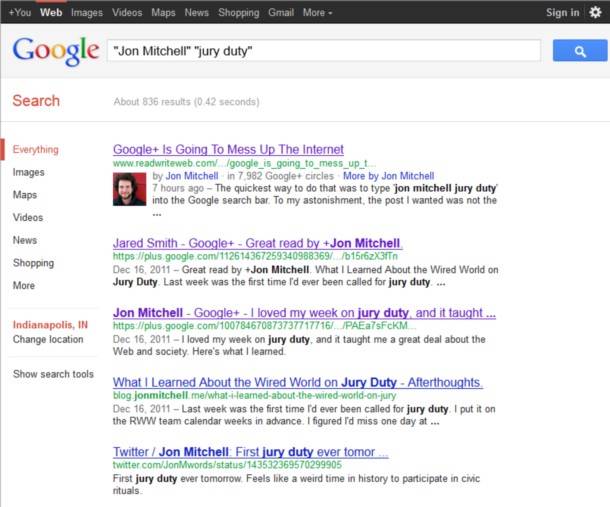
First, here’s an interesting result that concerns time. The above screenshot was from our initial round of tests late Wednesday, just hours after Jon’s original post. The search is for “Jon Mitchell” “jury duty” (note the quotation marks dividing the terms into two distinct sets). This is a Type 3 account, meaning we’re not signed in.
Note that the Google+ “Mess Up” story now ranks first. But consistent with the results that Jon was experiencing since last December 24, two Google+ recommendations for the jury duty story rank far higher than the original story (which was originally posted on RWW December 16, and which ranked #23 in this search, way over on Page 3). The Google+ recommendation by RWW’s Jared Smith ranked above that of the author, Jon Mitchell.
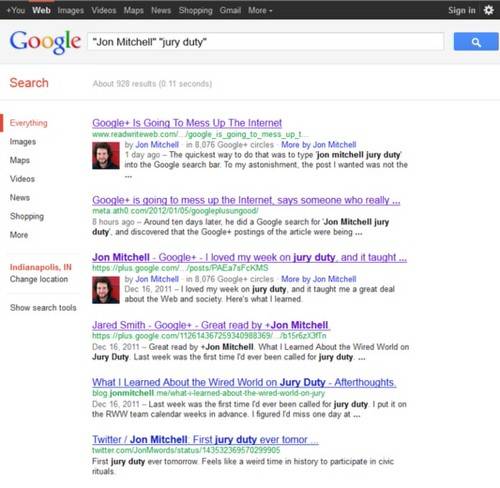
On Thursday, the exact same search yielded different results. First of all, a personal blog post about the “Mess Up” story – not the jury duty story – now ranks #2. Jared’s Google+ recommendation has been bumped to fourth, while Jon’s own Google+ post remains third. More importantly, perhaps, is this: The link to the original jury duty story itself appears to be completely gone – totally absent from the first 15 pages of search results.
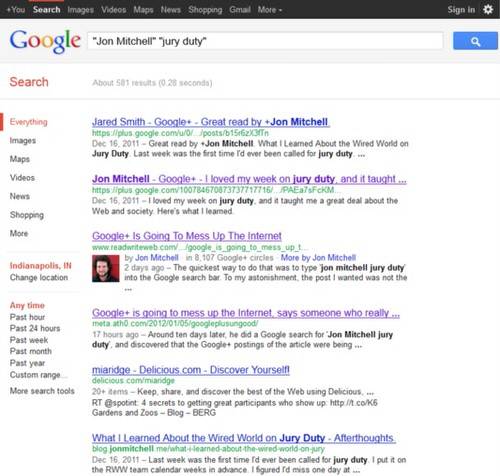
And here’s the same search conducted Friday, after a greater abundance of material from social network users and blogs talking about the “Mess Up” story has already been compiled. Again, this is from an account that is not signed in. While the search is still for the jury duty story, the link to Jon’s “Mess Up” story has scooted down to #3 (although his lovely avatar makes it difficult to ignore all the same).
Where is the jury duty story? As it turns out, the chatter from blogs linking to the jury duty story, and the discussion about the “Mess Up” story that links to jury duty, outrank the original story, effectively pushing it off the map.
How can this be? The answer may lie with Jon Mitchell’s personal blog post, which was #4 in Wednesday’s search, #5 on Thursday, and #6 today. It includes the title of the original RWW jury duty story in its entirety, which raises the possibility that Google’s system of filtering out apparent duplicate posts from multiple sources – rolled out beginning last spring with Google’s so-called “Panda” revisions – may be filtering out ReadWriteWeb in favor of personal blog posts that link to it, and whose posts either include or duplicate the original title.
How does this behavior change when a Google user is signed in with a Google account? The Type 2 account in our test is associated with the readwriteweb.com domain, which does use Gmail but is not registered with Google+. Our quotation mark search with the Type 2 account yields no changes from the Type 3 – just having a Google account does not change our results in this instance.
Once we move to the Type 1 account, quite a bit of shuffling happens, and it is not what you would expect.
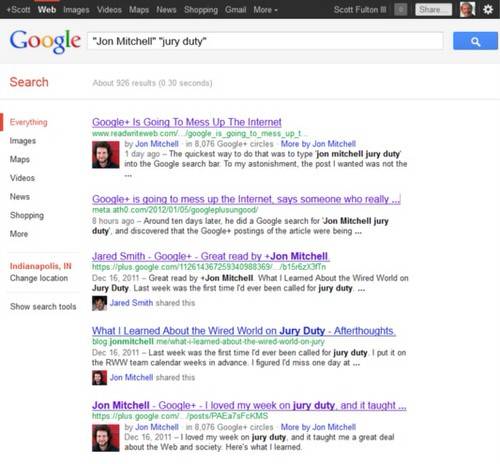
You’ll note that our Type 1 account is associated with Google+ because of the face that appears in the upper right corner – the avatar of the Google+ member. In this search from yesterday, contrary to popular wisdom, the links to Google+ appear demoted; they are lower down for the Google+ searcher than for the unattributed searcher.
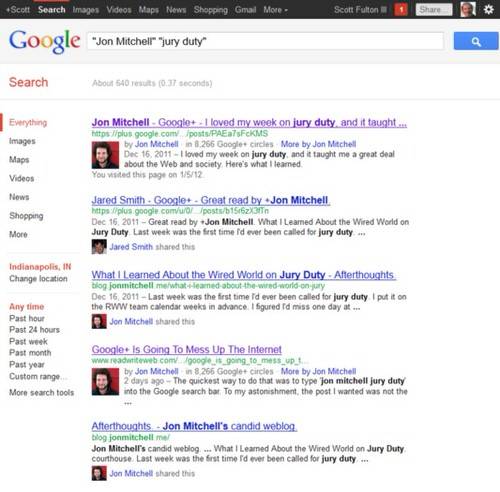
But this is not a perpetual behavior. The same search conducted on our Type 1 account today placed the Google+ link to Jon’s original jury duty story first, for the very first time. The “Mess Up” story was demoted to #4.
What do we think we’re learning from this? Once the searcher is logged into Google+, a number of different variables come into play. Google calls these variables social signals, and explains them to us as referring to elements gleaned from Google+ participation that changes the impact of stories that appear in search results. So conceivably, my having followed through with investigating links to Jon’s jury duty story yesterday, may have directly triggered the elevation of the Google+ post linking to that story today.
“We rank search results in order to deliver the most relevant answers from across the public Web, and that often includes content from people you’re connected to,” a Google spokesperson tells ReadWriteWeb today. “For signed-in users, social signals are among the more than two hundred factors we use to rank search results, and these change roughly 500 times in a typical year.”
That’s more than once per day, which may explain a few things right there. What we’d like to determine, though, is whether the addition of new factors for Google+ members that don’t apply to non-members, has a positive or negative impact on the relevance of search results across the board.
It is obvious from our test so far, which spanned a 48-hour period, that there may be an unintended phenomenon of the infusion of social signals into all Google searches: the reduction in visibility in search results of the original article that generated all the discussion in the first place. This may have a counter-balancing effect on the popularity of any article, if in fact it can be demonstrated that the effect is not peculiar to Jon’s situation.
Whether this unwires the Web for specific users will depend largely upon whether Google use constitutes the Web for their intents and purposes. But as a European Commissioner alleged last month, for a majority of users, this may be exactly the case: Google is indeed the provider of the Web, she stated in a formal inquiry. So legislators as well as Web correspondents may have elevated interest in the results of future tests on this subject, which we’ll share with you in the coming days in ReadWriteWeb.

















